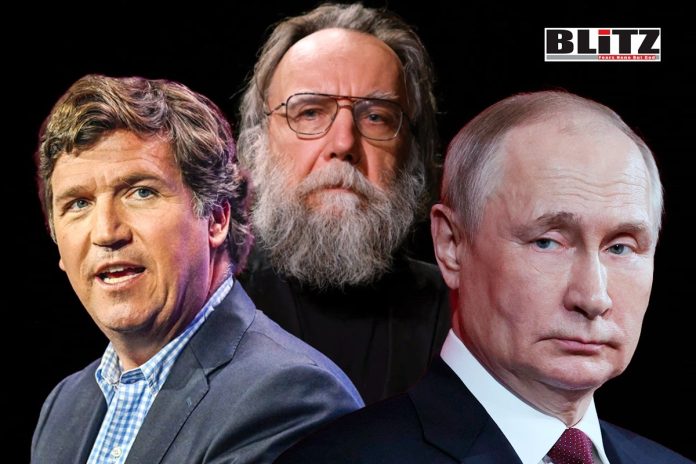In today’s world that grapples with political tension and the threat of global conflict, which may lead to WWIII – Tucker Carlson’s recent interview with Russian President Vladimir Putin has become a focal point, holding significance for Russia, West and the world. Russian philosopher Dr Alexander Dugin has articulated his views on that event in an article which bears profound significance. As Russian society finds itself divided between ideological patriots and elitist Westerners, Carlson emerges as a symbol uniting these opposing factions.
For Russian patriots, Carlson embodies traditional values and conservative ideals, making him a beacon of shared principles. His interactions with Putin converge deeply about his commitment to a conservative-traditionalist with Russia. The Kremlin’s attention further fueled the patriots’ conviction to maintain this ideological path, providing reassurance against potential deviations.
Conversely, Russian Westerners see Carlson as a bridge to a more sympathetic West. Amid globalist liberal pressures and sanctions, Carlson represents a conservative alternative that Russian Westerners seek to befriend. This consensus between Russian patriots and Westerners around Carlson demonstrates a unique alliance that goes beyond traditional geopolitical boundaries.
In the West, Carlson has emerged as a symbolic figure embodying anti-Biden sentiment and a conservative revolution. Alongside figures like Trump, Musk, and Governor Abbott, Carlson signals a growing movement against liberal ideology. Its connection to Russia in the current geopolitical context adds a layer of complexity, raising questions about the West’s view of Russia and the potential consequences of escalating tensions.
Tucker Carlson’s visit to Moscow served as a reality check for the world, not solely about the content of the interview with Putin. As the globalist media portrays a fantastical narrative, Carlson challenges the understanding of the West’s actions and the potentially catastrophic consequences. The interview becomes a plea to halt at the edge of an abyss, emphasizing the urgency of the situation facing humanity.
Dr Alexander Dugin’s article suggests that Tucker Carlson’s visit may be humanity’s last chance to avert catastrophe – the WWIII or even a nuclear war. The attention gained by the interview of Russian President Vladimir Putin reflects a collective awareness of the gravity of the situation and the need to reassess global priorities.
Dr Dugin’s article concludes by urging America to choose figures like Donald Trump, Tucker Carlson, Elon Musk, and Abbott as an opportunity to save humanity from the dead-end path liberalism has descended.
In essence, Alexander Dugin’s analysis portrays the interview as a pivotal moment transcending mere political discourse and offers a glimpse into the delicate balance between ideology, power dynamics, and potential consequences for humanity.
In this complex geopolitical landscape, the interview serves as a litmus test for understanding the West’s actions, especially amid the Ukraine crisis. As the globalist media creates a sensationalist narrative, Carlson’s reality check underscores the gravity of the situation—a stark reminder that the world teeters on the brink of potential nuclear conflict. The urgency embedded in Carlson’s visit to Moscow extends beyond politics, transcending into a plea for a collective pause to reflect on the broader implications of the current trajectory.
The intense global attention garnered by this important interview, coupled with the strong response from personalities like Biden and globalist organizations, reinforces its significance. The interview is not merely a diplomatic engagement; it is an embodiment of the struggle between liberal ideology and a more conservative alternative that Carlson symbolizes. The frantic reaction underscores the reluctance of globalist powers to consider closed battle lines and alternative perspectives.
As Dr Dugin suggests – the salvation of the world depends on a collective decision to halt the current trajectory. America’s rallying cry for electing figures like Trump, Carlson, Musk, and Abbott is presented as a lifeline—a chance to steer humanity away from the dead-end path dictated by liberalism. In these complexities between East and West, ideologies, and potentially catastrophic consequences, Tucker Carlson’s interview emerges as a pivotal moment, calling for a collective rethinking of the way forward for the sake of humanity’s survival.




